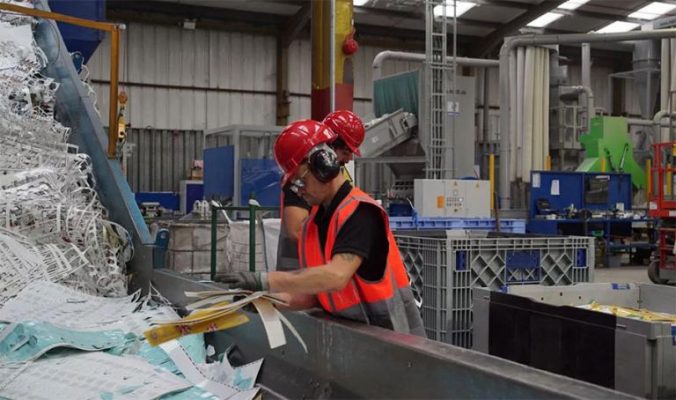Have you compared the cost of reprocessing your own material vs the rebates and service offered by dedicated plastic recycling firms? Or are you assuming that, by granulating yourself, you will see more benefits? Vanden Recycling explains more…
The drive to create sustainable supply chains has increased intensely in recent years. There are several factors at play here: where bottles and packaging are concerned, retailers and brands want to meet consumer demand, while new legislation also requires them to include recycled content like rPET. To meet these needs and targets, several firms choose to granulate their scrap plastic in-house. Reducing waste costs, ensuring feedstock is high quality and free from contaminants, and improving recovery rates – there are many reasons why firms choose to granulate in-house.
At surface level, in-house granulation might appear as a strategy that will save costs and create an efficient closed-loop supply chain, but there are a few elements that contradict this train of thought.
What is the validity for outsourcing the granulation of material? We explain more below.
Operating costs
Inhouse granulators are industrial machinery. They require three-phase electricity, which is not only a cost to the business, but could create an Opportunity Cost in the future when you want to install other production lines.
Cost of regularly buying new blades, sharpening blades and administering the operations cannot be under-estimated.
The cost of machinery and equipment
From the beginning, there is a considerable cash investment required to purchase granulators, cyclones, extractors, conveyors, bag-fillers and handling equipment. In addition, there will be ongoing repairs and maintenance.
The true labour cost when granulating in-house
Running a granulating machine is a laborious task, requiring hours equivalent to a full-time member of staff.
Labour costs vary according to the size and capacity of the granulators. What you may be able to granulate in a day or a week, Vanden could process in an hour or a day respectively.
You must also take into consideration the time required for regular blade changes and the clean-down of each machine if you are changing materials. Labour will be used, but the machine will not be running.
Have you measured the value of the required floor space?
The machinery used to granulate material will be taking up floor space that could have been used for the core business. The square meters used for in-house granulation could be used to store finished goods or for production purposes, not plastic recycling.
How effectively have you measured the value of square meterage?
Maintenance and breakdown risk
The level of maintenance required for this machinery will vary between businesses. Some will already possess the engineering expertise in-house, while others will require third party support.
The downtime caused by the breakdown of the machinery causes a great distraction to the business, diverting focus away from manufacturing, potentially impacting space and productivity.
Have you considered the call-out period for maintenance work? They often range between 24-48 hours. Something as minor as a conveyor belt issue could cause significant disruption.
A breakdown will mean the space dedicated to this activity isn’t being used effectively; what will this cost be to your business?
Consider health and safety
With a production environment, your business should have health and safety protocols in place anyway. However, new machinery will require their own risk assessments to be carried out, as a result of this there may be:
– Noise pollution
– Monitoring dust pollution
– Blade changes
– Risk of manual handling of the material into the granulator
– PPE monitoring and training
Dust becomes an inherent problem across the manufacturing site and, as a result, extraction, filtration, dust masks and contamination become factors to consider.
Additional onboarding and training processes will have to implemented to minimise the associated risks.
What about the extra cost associated with packaging and storing the granulated products?
You will require big bags and pallets to store the granulated product, which adds to the cost of production.
Alongside floor space required for the granulating machinery, you will also need adequate space dedicated to store the material. If you find that internal space is limited, you may opt to store the product outside.
In these instances, the product must be correctly sealed to prevent it from being affected by the elements. If you can afford internal space, it must be dedicated to the granulated material to prevent cross-contamination.
Cross-contamination is a serious issue
The cross-contamination of plastics and batches that are rejected often occurs when the material is granulated in-house. This is down to insufficient clean-downs between polymer types or accidental contamination from the operator.
Unless you have separate granulators for each polymer, contamination can occur across tonnes of materials.
Metal contamination can also become an issue meaning metal removal systems must be installed and detection alarms on conveyors.
Opportunity Cost
The most valuable of them all! In business, what we decide to spend valuable time and resources on has second and third-order consequences that can impact the business long term, and in ways we do not expect. Have you considered what else you could be doing instead that would deliver value to your core business?
Here are some things to consider as an opportunity cost:
– R&D
– Management Time
– Capital
– Labour Time
– Space
– Dilution of focus away from core activity
– Administration time
– Electrical consumption
Vanden can work with your business to deliver flexible and bespoke plastic recycling solutions. Whether you require a toll service or an ongoing partnership, we can provide a reliable and trusted solution. Contact Vanden today to find out more.
Written by Paul Scott
Business Development Officer at Vanden Recycling
For more blog articles like this one, visit the Vanden Knowledge Centre.
Vanden Recycling
+44(0) 2892668009
Website
Email


